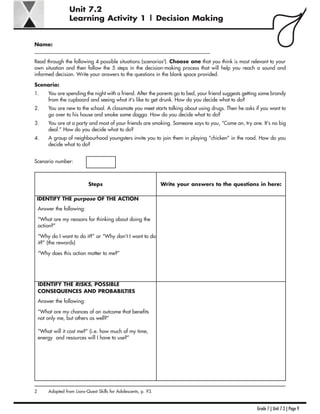7.2 la1
•
0 likes•399 views
This document provides a scenario for a student to choose from and then guides them through a 5-step decision making process to help reach an informed decision on what to do. The scenarios involve situations where peers encourage risky behavior like underage drinking, drug use, smoking, or dangerous acts. The 5 steps are to identify the purpose and rewards/risks of the action, assess consequences and probabilities, evaluate information reliability, consider alternatives and compromises, and feel good about making a wise choice.
Report
Share
Report
Share
Download to read offline

Recommended
Recommended
More Related Content
Similar to 7.2 la1
Similar to 7.2 la1 (20)
Business Ethics Rubric—Mid-term Case StudyI will b.docx

Business Ethics Rubric—Mid-term Case StudyI will b.docx
Chapter 6 Ask Questions That Lead to Good Thinking From what we ha.docx

Chapter 6 Ask Questions That Lead to Good Thinking From what we ha.docx
Cognitive Behavioural Therapy: A Basic Overview (Presentation)

Cognitive Behavioural Therapy: A Basic Overview (Presentation)
Business Ethics Rubric—Mid-term Case StudyI will be looking fo.docx

Business Ethics Rubric—Mid-term Case StudyI will be looking fo.docx
Dean R Berry Problems and Solutions of Global Warming 

Dean R Berry Problems and Solutions of Global Warming
Sample questions stems based in revised Bloom's taxonomy

Sample questions stems based in revised Bloom's taxonomy
More from NRGPSchools
More from NRGPSchools (20)
7.2 la1
- 1. Name: ____________________________________________________________________ Read through the following 4 possible situations (scenarios2 ). Choose one that you think is most relevant to your own situation and then follow the 5 steps in the decision-making process that will help you reach a sound and informed decision. Write your answers to the questions in the blank space provided. Scenario: 1. You are spending the night with a friend. After the parents go to bed, your friend suggests getting some brandy from the cupboard and seeing what it's like to get drunk. How do you decide what to do? 2. You are new to the school. A classmate you meet starts talking about using drugs. Then he asks if you want to go over to his house and smoke some dagga. How do you decide what to do? 3. You are at a party and most of your friends are smoking. Someone says to you, “Come on, try one. It's no big deal.” How do you decide what to do? 4. A group of neighbourhood youngsters invite you to join them in playing “chicken” in the road. How do you decide what to do? Scenario number: Grade 7 | Unit 7.2 | Page 9 Unit 7.2 Learning Activity 1 | Decision Making 2 Adapted from Lions-Quest Skills for Adolescents, p. 93. Steps Write your answers to the questions in here: IDENTIFY THE purpose OF THE ACTION Answer the following: “What are my reasons for thinking about doing the action?” “Why do I want to do it?” or “Why don’t I want to do it?” (the rewards) “Why does this action matter to me?” IDENTIFY THE RISKS, POSSIBLE CONSEQUENCES AND PROBABILTIES Answer the following: “What are my chances of an outcome that benefits not only me, but others as well?” “What will it cost me?” (i.e. how much of my time, energy and resources will I have to use?”
- 2. Grade 7 | Unit 7.2 | Page 10 What are all the possible (realistic) consequences?” “What are the probabilities of them happening?” Think through the various options of “What if ?” “How can I reduce the risk of a bad outcome?” ASSESS THE RELIABILITY OF YOUR INFORMATION Ask yourself: “Is my information complete?” “Is my information reliable?” “What additional information do I need?” CONSIDER COMPROMISES AND CREATE ALTERNATIVES Ask yourself: “How else could I use my time, energy, resources, talents and opportunities?” “Can I develop other reasons for engaging in the action?” “By engaging in the risky behaviour, how do I compensate (pay back) others who may be at risk as a result of my action?” “By not engaging in the risk behaviour, how will I reward myself?” ENJOY THE FEELING OF HAVING DONE WELL Having invested in the decision making process, enjoy the reward of knowing you have acted wisely (even if you can’t always fully control the outcomes!) Write your final decision here: